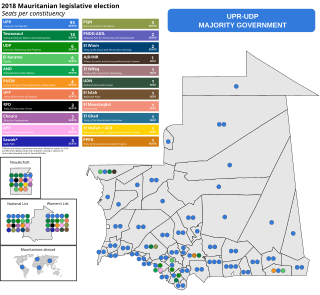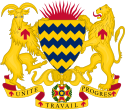
The two-round system, also called ballotage, top-two runoff, or two-round plurality, is a single winner voting method. It is sometimes called plurality-runoff, although this term can also be used for other, closely-related systems such as instant-runoff voting or the exhaustive ballot. It falls under the class of plurality-based voting rules, together with instant-runoff and first-past-the-post (FPP). In a two-round system, if no candidate receives a majority of the vote in the first round, the two candidates with the most votes in the first round proceed to a second round where all other candidates are excluded. Both rounds are held under choose-one voting, where the voter marks a single favored candidate.
The History of Benin since the 16th century, for the geographical area included in 1960 in what was then called the Republic of Dahomey before becoming the People's Republic of Benin.

Elections in Benin take place within the framework of a multi-party democracy and a presidential system. Both the President and the National Assembly are directly elected by voters, with elections organised by the Autonomous National Electoral Commission (CENA).

Elections in the Comoros take place within the framework of a multi-party democracy and a presidential system. The President and the majority of the seats in the Assembly of the Union are directly elected.

Elections in Portugal are free, fair, and regularly held, in accordance with election law.

Elections in Guinea-Bissau take place within the framework of a multi-party democracy and a semi-presidential system. Both the President and the National People's Assembly are directly elected by voters.

Elections in Kenya take place within the framework of a multi-party democracy and a presidential system. The President, Senate and National Assembly are directly elected by voters, with elections organised by the Independent Electoral and Boundaries Commission (IEBC).
Switzerland elects on national level a collective head of state, the Federal Council, and a legislature, the Federal Assembly.

Elections in Zambia take place within the framework of a multi-party democracy and a presidential system. The President and National Assembly are simultaneously elected for five-year terms.

Legislative elections were held in France on 10 June and 17 June 2007 to elect the 13th National Assembly of the Fifth Republic, a few weeks after the presidential election run-off on 6 May. 7,639 candidates stood for 577 seats, including France's overseas possessions. Early first-round results projected a large majority for President Nicolas Sarkozy's Union for a Popular Movement (UMP) and its allies; however, second-round results showed a closer race and a stronger left. Nevertheless, the right retained its majority from 2002 despite losing some 40 seats to the Socialists.

The prime minister of Slovenia, officially the president of the Government of the Republic of Slovenia, is the head of the Government of the Republic of Slovenia. There have been nine officeholders since the country gained parliamentary democracy in 1989.

An electoral or voting system is a set of rules used to determine the results of an election. Electoral systems are used in politics to elect governments, while non-political elections may take place in business, non-profit organisations and informal organisations. These rules govern all aspects of the voting process: when elections occur, who is allowed to vote, who can stand as a candidate, how ballots are marked and cast, how the ballots are counted, how votes translate into the election outcome, limits on campaign spending, and other factors that can affect the result. Political electoral systems are defined by constitutions and electoral laws, are typically conducted by election commissions, and can use multiple types of elections for different offices.
Roland Bouiti-Viaudo is a Congolese politician who was Mayor of Pointe-Noire, the second-largest city in Congo-Brazzaville, from 2003 to 2017. He has served as Second Vice-President of the National Assembly since 2017, and he has been the President of the Movement for Action and Renewal (MAR), a political party, since 2010.

General elections were held to in the Central African Republic on 22 August 1993, with a second round on 19 September 1993. They followed the previous year's elections, the results of which had been voided by the Supreme Court due to irregularities.

Parliamentary elections were held in Mauritania on 23 November. The opposition has vowed to boycott the election unless the president steps down beforehand. A total of 1,096 candidates have registered to compete for the leadership of 218 local councils across Mauritania, whilst 438 candidates are contesting for the 146 parliamentary seats. Some 1.2 million Mauritanians were eligible to vote in the election. The first round results yielded a landslide victory for the ruling UPR winning 56 seats and their 14 coalition partners winning 34 seats. The Islamist Tewassoul party won 12 seats. The remaining seats were contested in a runoff on 21 December 2013. The UPR won the majority with 75 seats in the Assembly.

Parliamentary elections were held in the Republic of the Congo on 15 July 2012. A second round was held on 5 August 2012. The second round was previously moved forward to 29 July, without explanation, but ultimately was held on the original date.

Regional elections were held in France on 6 and 13 December 2015. At stake were the regional councils in metropolitan and overseas France including the Corsican Assembly and inaugural seats in the Assembly of French Guiana and Assembly of Martinique, all for a six-year term. The Departmental Council of Mayotte, which also exercises the powers of a region, was the only region not participating in this election, having already been renewed on 2 April 2015. There were 18 regional presidencies at stake, with 13 in mainland France and Corsica, as well as 5 overseas. Though they do not have legislative autonomy, these territorial collectivities manage sizable budgets. Moreover, regional elections are often taken as a mid-term opinion poll.

Parliamentary elections were held in Mauritania in September 2018; the first round took place on 1 September, with a second round held on 15 September. At the national level, elections were held in 157 constituencies, each electing one member to the National Assembly. Elections were also held in 13 regional councils and 219 municipalities.

General elections were held in Namibia on 27 November 2019. Ballots were cast using electronic voting. A total of eleven candidates ran for the presidency and fifteen political parties contested the National Assembly elections.
The 2020 International Court of Justice election were held on 11 and 12 November 2020 at the United Nations Headquarters in New York City. In the set of triennial elections, the General Assembly and the Security Council concurrently elect five judges to the Court for nine-year terms, in this case beginning on 6 February 2021. From the eight candidates, Yuji Iwasawa (Japan), Xue Hanqin (China), Peter Tomka (Slovakia), Julia Sebutinde (Uganda), and Georg Nolte (Germany) have been elected members of the International Court of Justice for a term of office of nine years, as both the Security Council and the General Assembly have agreed on the same candidates.















